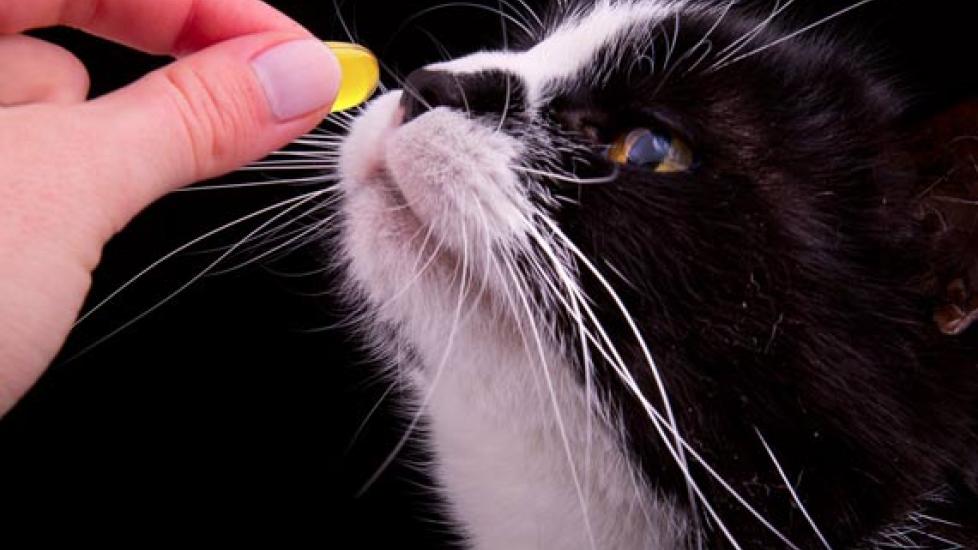Two Nutritional Supplements All Pets Should Be Taking
I am sure you have all been told that your pets don’t need any supplements if they are on a commercial diet that meets AAFCO (Association of American Feed Control Officials) nutrient requirements. For adequate nutrition that is probably true. But who wants just adequate nutrition for their pet?
Like ourselves, we want our pets at maximum health and wellness. Commercial diets fall short of providing the quality that pet parents want. Expensive brands that add various supplements don’t fill the bill either. Despite their marketing, the companies seldom include the supplements in quantities that are considered therapeutic or helpful. Mounting evidence suggests that there are certain supplements that will improve pet health. What are those supplements?
DHA and EPA
DHA (docosahexaenoic acid) and EPA (eicosapentaenoic acid) are omega-3, polyunsaturated fats. These fatty acids are important in tempering the inflammatory response of the immune system. It is this anti-inflammatory effect that makes DHA and EPA helpful in reducing itching in allergic pets and reducing joint pain in pets with osteoarthritis. The anti-inflammatory effect is also thought to decrease the symptoms of dementia and hearing loss in geriatric pets. New research suggests that learning and other cognitive brain functions are improved in puppies supplemented with DHA and EPA.
Fish oil is the richest source for DHA and EPA. Krill oil is a somewhat distant second. Because of the chemical formulation of these fatty acids in krill it is believed they are more readily bioavailable, so a higher dose is not necessary. Unfortunately this has yet to be proven in humans or animals.
Oils made from algae are rich in DHA but do not contain EPA. Because DHA is the end product of EPA metabolism in the inflammatory reaction chain this may not be important. However there are few studies that have compared algal oil to fish oil for pain or allergy relief. Flaxseed and other plants are poor sources of DHA and EPA due to the poor efficiency of mammals to convert plant omega-3 to DHA and EPA.
My preference is still fish oil due to the higher concentrations of DHA and EPA and affordability.
Prebiotics and Probiotics
An amazing amount of research points to the fact that gut health is not only important for digestion but necessary for effective internal immune function. Maintaining a beneficial bacteria population of the colon is now the primary treatment for intestinal problems or problems with an intestinal origin.
Prebiotics and probiotics are becoming standard treatment for vomiting and diarrhea. Treating boarding pets or pets subject to other stressful situations with pre- and probiotics helps prevent stress induced colitis and diarrhea. Maximum gut health is now thought to play a role in preventing asthma and aiding in the treatment of respiratory, allergic, and autoimmune conditions.
Prebiotics are non-digestible fiber products that are fermented for food by many of the beneficial bacteria in pets’ colons. Inulin, a fructan fiber, is found in more than 36,000 plants, including bananas, asparagus, and wheat bran. Chicory is the richest source and is the source used for most inulin prebiotics. Metamucil Clear and Natural is 100 percent inulin from chicory.
Probiotics are products containing beneficial bacteria. Yogurt and acidophilus are probably the best known and the most readily available to most pet owners. Now pet store and veterinary shelves are crowded with a wide variety of probiotic formulas.
There are disadvantages to probiotics. The bacteria must survive the harsh acid environment of the stomach before reaching the intestines and colon. A probiotic product that does not include a technology to protect the bacteria from stomach acid will probably not be very effective. Giving probiotics to your pet with a meal will decrease stomach acid destruction of the bacteria.
Bacterial colony counts in probiotic products should be in the billions. The intestines contain trillions of bacteria so products with colony counts only in the millions will have a minimal effect on your pet’s gut health.
And most importantly, there are no FDA testing requirements for manufacturers that the bacteria in their product are actually alive and useful. This is even true of probiotics marketed for human consumption.
These disadvantages are a reason I prefer prebiotics. The major reason however is the individuality of the pet. There are hundreds to thousands of different types of intestinal bacteria. The populations of beneficial bacteria may differ from pet to pet. This, I think, is the major reason different pets react differently to different brands of dog food. Rather than try and influence the individual pet’s gut flora with a probiotic, why not just provide food for good bacteria, a prebiotic, and promote the bacterial colonies that work best for the pet.
All pets of all ages should have adequate amounts of these supplements in their wellness plan. Ask your vet for appropriate dosages and amounts for your pet(s).

Dr. Ken Tudor
